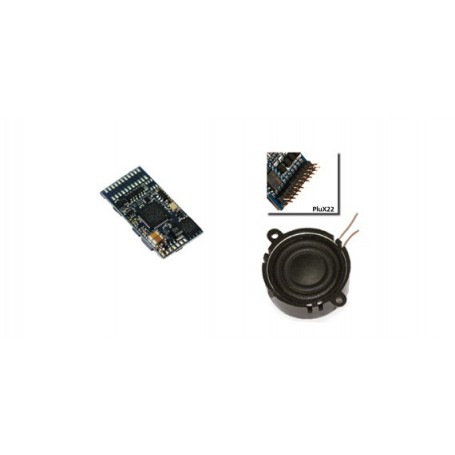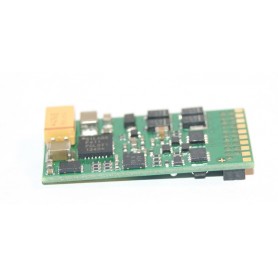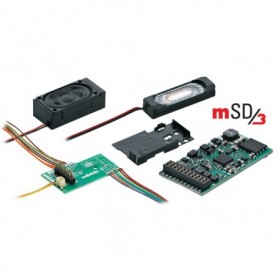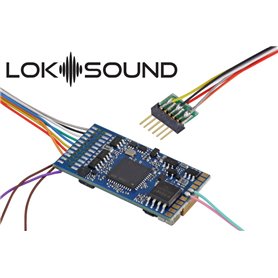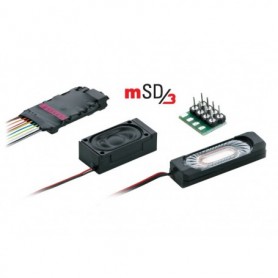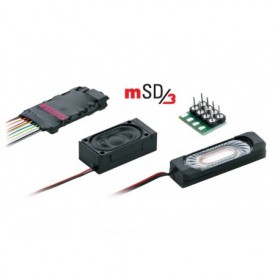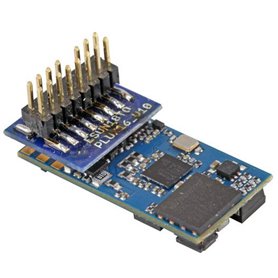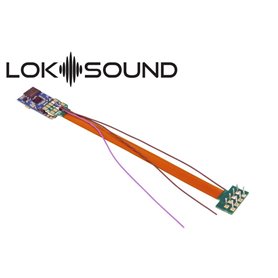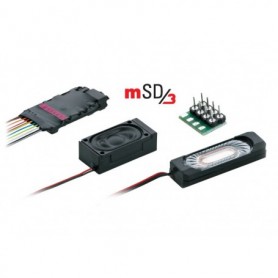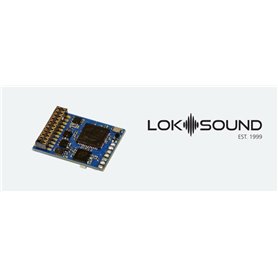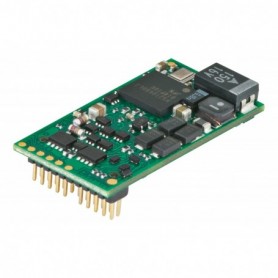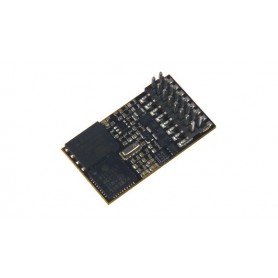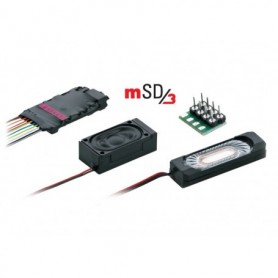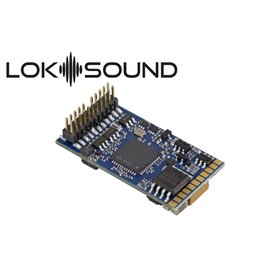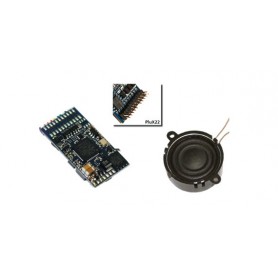LokSound V4.0 "Universal sound for reprogramming", PluX22, Gauge: 0, H0
LokSound V4.0 'Universal sound for reprogramming', PluX22, Gauge. 0, H0
Bevaka artikel
-
 Betala säkert i vår webshop!
Betala säkert i vår webshop!
Beskrivning
LokSound V4.0 'Universal sound for reprogramming', PluX22, Gauge: 0, H0.
There has been a lot of reviews about our LokSound decoder. They do their work worldwide in locos and provide a maximum of fun, so we expect you to expect more from us (as being the pioneer in this field) than a simple extension of existing products. When we introduce the LokSound V4.0 decoder today, which is the fourth generation after its great grandfather LokSound Classic.
Our new LokSound decoder will convince you once more with its inner values.
The LokSound decoder is still a combination of driving decoder and sound module on one PCB. You can install it in nearly every loco in H0 and 0 scale according to its dimensions of 30mm in length and a width of 15mm and so be able to control driving, light and sound.
LokSound V4.0 decoders are offered with all established plugs, either with the 8-pin NEM 652 connector, the 6-pin NEM651 connector and the PluX12 connector or the wireless versiones with either the 21MTC interface (NEM660) or PluX16 or PluX22.
All LokSound decoders are delivered with 23mm speakers.
Operation modes
The LokSound V4.0 recognises DCC, Selectrix® and the Motorola® protocol. It can be operated with 14, 28 or 128 drive steps or on analogue DC layouts in DCC mode.You can assign the decoders to 2-digit, 3-digit (1-127) or 4-digit (1-9999) addresses as well as a consist address.
The Motorola®-protocol provides the operation of the LokSound V4.0 decoders with Märklin® control stations 6020®, 6021®, delta®, mobile station® and central station®. The decoders can be used with the addresses 01 255 on this mode. A second address provides the possibility to use the function keys F5 to F8.
The Selectrix® protocol provides the possibility to use LokSound V4.0 decoders with this also established system. All established DCC brake systems like the well-known Lenz LG100, but also the new Lenz® ABC brake units with asymmetrical DCC signal are recognised as well as the braking on DC (with switched polarity) or on Selectrix® diode brake systems. You can also use the well-known Märklin® brake system in DCC-mode.
Of course, our top decoder is able to determine a constant braking distance, so that your locos stop in front of the red signal, no matter what speed your loco is at.
LokSound V4.0 decoders are also able to operate on analogue DC and AC layouts.
The decoders can switch automatically between all modes (AC, Motorola®, DC, DCC, Selectrix®) during operation. This is important if some parts of your layout work with analogue control (e.g. fiddle yards).
Motor control
You expect an excellent motor control from a LokSound Decoder and deservedly so! LokSound V4.0 is equipped with the further improved 5th generation of load control. You can adjust the control frequency with a basic frequency of 40kHz adaptively. So many motors will run even better and softer. The 10 Bit A/D convertor makes it possible to drive your loco very slow on the tracks.
You can determine a limitation of the load controls influence with the Dynamic Drive Control (DDC) to control very accurately in station or shunting switch areas. Besides, uphill driving appears very natural with it.
The decoders load control is suitable for all common motors, no matter if by ROCO®, Fleischmann®, Brawa®, Mehano®, Bemo®, Märklin®, Faulhaber® or Maxon®. You can also use all-current motors as long as you replace the field winding by a HAMO Magnet.
Constant current of 1.1A continuous current are more than enough for the motors mentioned above and provide enough power even for long trains.
SoftDrive® Sinus motors, which are often used on Märklin® locos can also be controlled by the LokSound V4.0 decoders.
The new serial communication protocol provides from now on the operation on Trix®-locos.
Sound
The most important element of the new LokSound V4.0 decoders is the sound chip. This is why we have equipped the LokSound V4.0 with an enormous memory of 32 MBit to save up to 276 seconds of original sounds.
The LokSound V4.0 works with 8 polyphonic channels, i.e. that the decoder is able to play up to 8 different sounds simultaneously, using the 16-Bit mixer and the nearly noiseless D/A convertor.
So we can provide a much better monitoring of the original locomotive´s complex elements as it is possible to combine several channels.
Youll recognise the difference at once! The sounds will be amplified up to three times louder than before by using a new digital class D amplifier.
We also changed from the old type of speakers to speakers with an impedance of 4 Ohms. Use our provided stock of new developed speakers!
All single sounds of the LokSound V4.0 can be mixed in volume individually on nearly every digital control station.
The new super flexible sound engine without static schedule provides a very prototypical simulation of all railroad vehicles.
Analogue mode
LokSound V4.0 decoders can be used on DC as well as on AC layouts. The motor and the synchronisation of all driving-, sound- and light functions will be controlled in analogue mode, too!
So, model railroaders without digital systems can enjoy the LokSounds, despite the sounds on function keys.
Functions
LokSound V4.0 decoders have 4 function outputs with the possibility of using constant current of 250mA. These outputs can be assigned individually. Apart from that, there are two more non-amplified outputs with logic level. You can use those in combination with fitting adaptor PCBs (e.g. ESU 51968) to control more light or special physical functions. All important light functions like Flash, Gyrolight, Mars light, fire box and so
on are provided including the individual adjustment of brightness for each function.
Of course, the decoders provide automatic coupling and decoupling for couplers by Roco®, Krois® and Telex® and from now on even a full beaming head light function.
The LED mode controls the right light effects when using LEDs.
Safe operation
If desired it is possible to connect a PowerPack (ESU Art.No. 54670) to the LokSound V4.0, as to all other ESU decoders of the 4th generation. This energy storage continues to supply the decoder with energy if the power consumption is not isn´t optimal due to dirty tracks.
RailComPlus®
A very important function of the LokSound V4.0 decoder is the integrated RailComPlus® function. Your locos will be recognised automatically by an appropriate digital command station fast as lightning and will receive, if needed, a new address. Forget about the cumbersome typing and programming!
Protection
Of course, all function outputs and the motor current output are overload protected. We want you to have fun with your decoder as long as possible!
Future built-in
You can update the firmware of the LokSound decoders. This means, the internal software on the decoders memory can be replaced by new versions if necessary. Youll simply need the ESU LokProgrammer and a PC.
Sound variations
ESU, as the technologic and market leader takes your requirements for sound very seriously. There are already more than 200 sound variations available for the LokSound V4.0
ESU is extending the sound library all the time and provides all sounds on our homepage for free download.
There has been a lot of reviews about our LokSound decoder. They do their work worldwide in locos and provide a maximum of fun, so we expect you to expect more from us (as being the pioneer in this field) than a simple extension of existing products. When we introduce the LokSound V4.0 decoder today, which is the fourth generation after its great grandfather LokSound Classic.
Our new LokSound decoder will convince you once more with its inner values.
The LokSound decoder is still a combination of driving decoder and sound module on one PCB. You can install it in nearly every loco in H0 and 0 scale according to its dimensions of 30mm in length and a width of 15mm and so be able to control driving, light and sound.
LokSound V4.0 decoders are offered with all established plugs, either with the 8-pin NEM 652 connector, the 6-pin NEM651 connector and the PluX12 connector or the wireless versiones with either the 21MTC interface (NEM660) or PluX16 or PluX22.
All LokSound decoders are delivered with 23mm speakers.
Operation modes
The LokSound V4.0 recognises DCC, Selectrix® and the Motorola® protocol. It can be operated with 14, 28 or 128 drive steps or on analogue DC layouts in DCC mode.You can assign the decoders to 2-digit, 3-digit (1-127) or 4-digit (1-9999) addresses as well as a consist address.
The Motorola®-protocol provides the operation of the LokSound V4.0 decoders with Märklin® control stations 6020®, 6021®, delta®, mobile station® and central station®. The decoders can be used with the addresses 01 255 on this mode. A second address provides the possibility to use the function keys F5 to F8.
The Selectrix® protocol provides the possibility to use LokSound V4.0 decoders with this also established system. All established DCC brake systems like the well-known Lenz LG100, but also the new Lenz® ABC brake units with asymmetrical DCC signal are recognised as well as the braking on DC (with switched polarity) or on Selectrix® diode brake systems. You can also use the well-known Märklin® brake system in DCC-mode.
Of course, our top decoder is able to determine a constant braking distance, so that your locos stop in front of the red signal, no matter what speed your loco is at.
LokSound V4.0 decoders are also able to operate on analogue DC and AC layouts.
The decoders can switch automatically between all modes (AC, Motorola®, DC, DCC, Selectrix®) during operation. This is important if some parts of your layout work with analogue control (e.g. fiddle yards).
Motor control
You expect an excellent motor control from a LokSound Decoder and deservedly so! LokSound V4.0 is equipped with the further improved 5th generation of load control. You can adjust the control frequency with a basic frequency of 40kHz adaptively. So many motors will run even better and softer. The 10 Bit A/D convertor makes it possible to drive your loco very slow on the tracks.
You can determine a limitation of the load controls influence with the Dynamic Drive Control (DDC) to control very accurately in station or shunting switch areas. Besides, uphill driving appears very natural with it.
The decoders load control is suitable for all common motors, no matter if by ROCO®, Fleischmann®, Brawa®, Mehano®, Bemo®, Märklin®, Faulhaber® or Maxon®. You can also use all-current motors as long as you replace the field winding by a HAMO Magnet.
Constant current of 1.1A continuous current are more than enough for the motors mentioned above and provide enough power even for long trains.
SoftDrive® Sinus motors, which are often used on Märklin® locos can also be controlled by the LokSound V4.0 decoders.
The new serial communication protocol provides from now on the operation on Trix®-locos.
Sound
The most important element of the new LokSound V4.0 decoders is the sound chip. This is why we have equipped the LokSound V4.0 with an enormous memory of 32 MBit to save up to 276 seconds of original sounds.
The LokSound V4.0 works with 8 polyphonic channels, i.e. that the decoder is able to play up to 8 different sounds simultaneously, using the 16-Bit mixer and the nearly noiseless D/A convertor.
So we can provide a much better monitoring of the original locomotive´s complex elements as it is possible to combine several channels.
Youll recognise the difference at once! The sounds will be amplified up to three times louder than before by using a new digital class D amplifier.
We also changed from the old type of speakers to speakers with an impedance of 4 Ohms. Use our provided stock of new developed speakers!
All single sounds of the LokSound V4.0 can be mixed in volume individually on nearly every digital control station.
The new super flexible sound engine without static schedule provides a very prototypical simulation of all railroad vehicles.
Analogue mode
LokSound V4.0 decoders can be used on DC as well as on AC layouts. The motor and the synchronisation of all driving-, sound- and light functions will be controlled in analogue mode, too!
So, model railroaders without digital systems can enjoy the LokSounds, despite the sounds on function keys.
Functions
LokSound V4.0 decoders have 4 function outputs with the possibility of using constant current of 250mA. These outputs can be assigned individually. Apart from that, there are two more non-amplified outputs with logic level. You can use those in combination with fitting adaptor PCBs (e.g. ESU 51968) to control more light or special physical functions. All important light functions like Flash, Gyrolight, Mars light, fire box and so
on are provided including the individual adjustment of brightness for each function.
Of course, the decoders provide automatic coupling and decoupling for couplers by Roco®, Krois® and Telex® and from now on even a full beaming head light function.
The LED mode controls the right light effects when using LEDs.
Safe operation
If desired it is possible to connect a PowerPack (ESU Art.No. 54670) to the LokSound V4.0, as to all other ESU decoders of the 4th generation. This energy storage continues to supply the decoder with energy if the power consumption is not isn´t optimal due to dirty tracks.
RailComPlus®
A very important function of the LokSound V4.0 decoder is the integrated RailComPlus® function. Your locos will be recognised automatically by an appropriate digital command station fast as lightning and will receive, if needed, a new address. Forget about the cumbersome typing and programming!
Protection
Of course, all function outputs and the motor current output are overload protected. We want you to have fun with your decoder as long as possible!
Future built-in
You can update the firmware of the LokSound decoders. This means, the internal software on the decoders memory can be replaced by new versions if necessary. Youll simply need the ESU LokProgrammer and a PC.
Sound variations
ESU, as the technologic and market leader takes your requirements for sound very seriously. There are already more than 200 sound variations available for the LokSound V4.0
ESU is extending the sound library all the time and provides all sounds on our homepage for free download.
Specifikation
- Interface
- NEM658 PluxX22
16 andra produkter i samma kategori:

